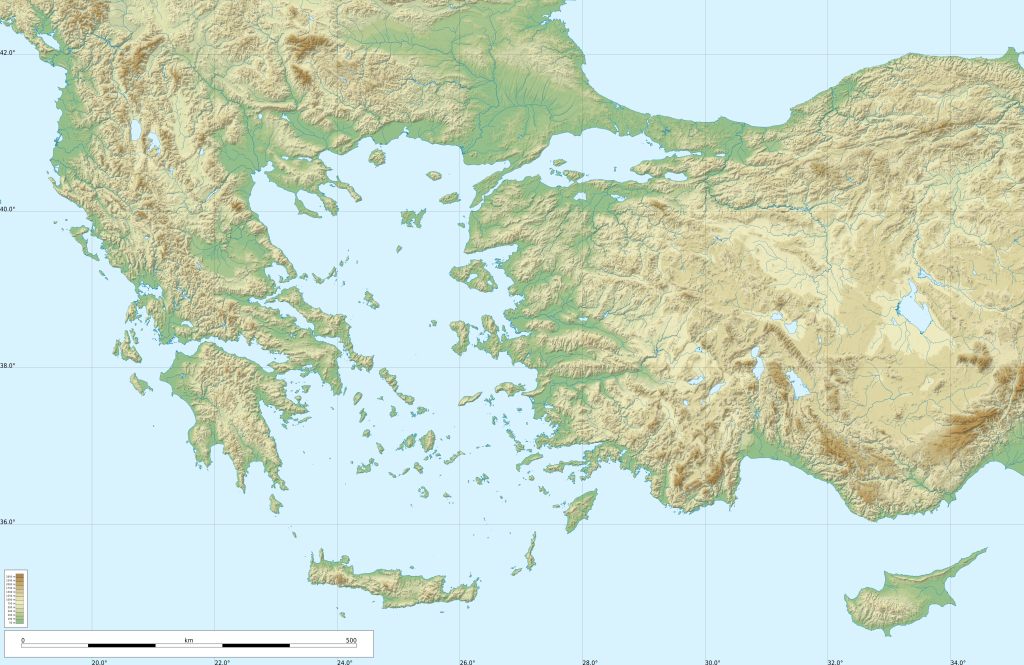The Aegean Sea Bastion of Freedom

Vassilios Damiras, Ph.D.
International Relations Expert
During the Greco-Persian wars (492–449 BC), the Aegean Sea became the first line of defense for the Greek city-states. Under Themistocles’s leadership, Athens built a strong navy and defeated the Persians. During the Peloponnesian War (432-404 BC), the Athenians sustained a thalassocracy until they lost the war. During these dramatic events, the Aegean Sea became the bastion of freedom. Later, Alexander the Great, the Romans, and the Byzantines continued to see Aegean as part of their strategic survival. In the twentieth century, the Royal Hellenic Navy and later the Hellenic Navy strived to sustain a Hellenic thalassocracy in the Aegean archipelago.
The United States had maintained a naval presence in the Mediterranean since the early 19th century when US Naval forces first engaged the Barbary pirates to prevent them from interfering with commercial shipping. The first naval unit was the Mediterranean Squadron. In modern times, the US Sixth Fleet continued this tradition. As true offsprings of the Ancient Greek socio-military culture, the Americans view the Aegean as a bastion of freedom. During the Cold War, the Aegean Sea prohibited free passage to the Soviet Navy. The US Sixth Fleet implemented the anti-access-aerial denial (A2/AD) against the Soviet fleet. Suda Bay Naval Base became a vital military installation. Currently, both Suda Bay and the port of Alexandroupoli play an essential role in monitoring Russian aggression and jihadist terrorist activities.
Specifically, the US Sixth Fleet was established in February 1950 by redesignation of the former Sixth Task Fleet, which in turn was the 1948 redesignation of the US Naval Forces, Mediterranean. Since then, the US Sixth Fleet engaged in world affairs around the Mediterranean and, on occasion, further afield. It was involved in numerous NATO maritime exercises, the US-Lebanese intervention in 1958 confrontation with the Soviets during the Yom Kippur War (also known as the October War) of 1973, clearance of the Suez Canal after 1973, several confrontations with Libya during the 1980s (including Operation El Dorado Canyon), and maintenance of task forces in the Adriatic Sea during the wars in former Yugoslavia in the 1990s. Most recently, it launched airstrikes on Libya again during the Libyan Civil War of 2011 and the Syrian Civil War of 2017.
Before the 2010s, in January 1996, the US Sixth Fleet averted a war between Greece and Turkey over the tiny island of Imia. Imia is a pair of small uninhabited islets in the southern part of the Aegean Sea situated between the Greek island chain of the Dodecanese and the southwestern mainland coast of Turkey. In Turkish, the name is Kardak. Imia was the object of a severe military crisis and subsequent dispute over sovereignty between Greece and Turkey in 1996. The Imia dispute was part of the more considerable Aegean dispute, which also comprised disputes over the continental shelf, the territorial waters, the air space, the Flight Information Regions (FIR), and the demilitarization of the Aegean islands. In the aftermath of the Imia crisis, the dispute widened as Turkey began to lay parallel claims to many other islets in the Aegean. These islands, some inhabited, are regarded as indisputably Greek by Greece but as grey zones of undetermined sovereignty by Turkey. The Turkish government wanted to exploit the new government of Costas Simitis and tried to seize Imia illegally. Both sides’ actions were irresponsible and endangered NATO’s and America’s interests in the region. However, officials of the US Sixth Fleet solved the dispute and pacified the two sides. In addition, the US Sixth Fleet increased its presence and visits to the Dodecanese islands. This action infuriated the Turkish officials but could not deter the actions of the US Sixth Fleet. The Imia crisis vividly indicates that the US Sixth Fleet protects the peace in the Aegean Sea.
The USA must continue to have a strong presence in the Aegean Sea and, together with the glorious Hellenic Navy, must continue to protect and safeguard a Greco-American thalassocracy. The US Navy and the Hellenic Navy have inherited the traditions of admirals Themistocles and Kountouriotis. Currently, The USA faces severe challenges in the region. Russia wants access to the Aegean Sea without inhibition from the USA. Turkey, under Erdogan, has adopted an anti-American and anti-Western policy. Also, Hamas and other jihadist terrorists want to destabilize the region. Thus, Aegean can be the bulwark of America’s grand strategy. The USA and Greece must be the guardians of Western Civilization in the area and the Aegean Sea to remain the bastion of freedom.




